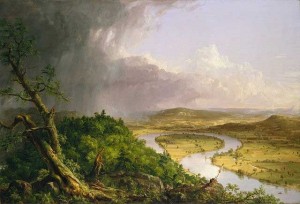
Thomas Cole’s The Oxbow (1836). The New England landscape that inspired Calvinist and Puritan ideals about landscape, a scientific world view and moral notions about use of the land. Source: Wikimedia Commons.
Ever since Lynn White’s 1967 essay on “The Historical Roots of Our Ecologic Crisis”, it is common to read in many publications that Christianity is both too anthropocentric and not much concerned with the protection of nature and the environment. Subsequently the environmental movement has developed along very secular lines using science to underpin their arguments for the protection of nature and the environment. For religion there seems no place amongst modern environmentalists. But in in the late 19th century and early 20th century this was quite different and early American conservationists were often deeply religious but had no difficulties in combining this with new scientific ideas about nature. A recent book entitled Inherit the Holy Mountain: Religion and the Rise of American Environmentalism shows that religion provided early environmentalists both with deeply embedded moral and cultural ways of viewing the natural world which provided them with the direction, and tone for the environmental causes they advocated. It reveals how religious upbringing left its distinctive imprint on the life, work, and activism of a wide range of environmental figures such as George Perkins Marsh, John Muir, Theodore Roosevelt, Rachel Carson, E. O. Wilson, and others.
This podcast episode explores the history of conservation and religion in America with Mark Stoll, Associate Professor of History at Texas Tech University, in Lubbock, Texas. He is the author of Inherit the Holy Mountain.
Further reading and resources
Inherit the Holy Mountain: Religion and the Rise of American Environmentalism, Oxford University Press, 2015
Mark Stoll, “Rachel Carson: The Presbyterian Genesis of a Nature Writer,” in: Nicolaas Rupke, ed., Eminent Lives in Twentieth-Century Science and Religion, 2nd rev. and much exp. ed. (New York: Peter Lang, 2009)
Mark Stoll, “Creating Ecology: Protestants and the Moral Community of Creation,” in: David M. Lodge and Christopher S. Hamlin, eds., Religion and the New Ecology: Environmental Responsibility in a World in Flux (Notre Dame: University of Notre Dame Press, 2006)
Lynn White Jr., “The Historical Roots of Our Ecologic Crisis”, Science, New Series, Vol. 155, No. 3767 (Mar. 10, 1967), 1203-1207
Stephen Fox, The American Conservation Movement: John Muir and His Legacy (Boston: Little, Brown, 1981).
Brian Donahue, The great meadow: farmers and the land in colonial Concord (New Haven: Yale University Press, 2004)
Carolyn Merchant, Ecological revolutions: nature, gender, and science in New England (Chaper Hill: University of North Carolina Press, 2nd. Ed. 2010)
Faculty page Mark Stoll, including information on previously published books.
Read Dan Allosso’s review of the podcast episode.
Music credits
“Where You Are Now” by Zapac, available from ccMixter
“On the Threshold” by Stefan Kartenberg from ccMixter


Recent Comments